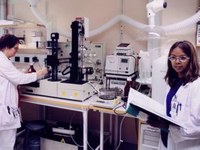Analytical Chemist

Miranda
Principal scientist working in a laboratory
In my particular role communication skills would be key, as you need to get your point of view across and get people to tell you what the problem is in order to solve it. Miranda
So, what do you do?
My role is at the very beginning of Research, at the exploratory stage through to when the compounds are ready for screening. I look after the open access facilities within the department, which are the facilities that the medicinal chemists use to test their samples using various types of analytical equipment for purity and to confirm the structure of the compound they have made.
What does your typical day involve?
At the start of the day I check my emails which will tell me if all the systems are working O.K. If there are any problems then I get straight in the lab and sort them out before getting on with the rest of my jobs. A lot of the work that I’m doing at the moment is troubleshooting, there’s a lot of equipment to look after, so I spend time making sure that all the systems are up and running, ensuring that the chemists have help and support in using them. The chemists come to me if they have any problems or need any advice. So it’s quite varied, no one day is the same as the next.
How has your career developed since you entered the industry?
I started out as a contractor in a similar role to the one I am doing now, after a year was offered a permanent position. Last year I was given a promotion, which involved more responsibility.
When did you decide on a career in the pharmaceutical industry?
I think it was when I did my year in the pharmaceutical industry during my chemistry degree. I became sure I wanted to work in the industry after my PhD.
What qualifications and experience do you have?
I studied chemistry, physics and maths A-levels and went on to do a 4 year MChem chemistry degree at Leeds University. At the end of our first year some people came in to talk to us about opportunities to spend a year in industry as part of my degree. I was really enjoying my degree and thought I’d really like to know what it would be like to apply what I’d learnt in the workplace and see if it was what I wanted to do as a career. Plus it meant I got paid for a year!
After my degree I moved to Birmingham to start a PhD in synthetic chemistry which involved a lot of NMR, which was one of the reasons I decided to work in analysis. At the end of my first year my supervisor moved us to St. Andrews so I finished my PhD there!
Do you think additional qualifications or experience would be an advantage for someone entering the industry now?
Not for my current post, I could have done this role without a PhD, but I think a PhD does help you long term in this kind of job.
Do you work mostly on your own or as part of team?
I have a team of people who help me make sure everything’s running OK, so I communicate closely with them. The rest of my time is more research based, looking in to ways of improving the technologies and seeing what direction we should be moving towards in offering support to chemists.
What is it like socially where you work?
It’s quite good actually, because I interact with so many different groups I get to meet up with a lot of different people on a daily basis. Sometimes we go down the pub for a drink, it’s a very social place to be, a nice environment to work in.
What are you most proud of in your career?
When I first started here one of the main drivers for the company was to harmonise open access across all the company sites worldwide, and since I’ve been here that has happened. That was made possible by the work that I have done in setting up systems and implementing methods, that is something that I’m proud of because I feel the chemists benefit from the input that I have had.
What possibilities are there for your career in the future?
If I stay as a scientist I guess it’s a case of working my way up, each year you get a bit more responsibility, and more money. My next step would be to have people to manage. Or I could move sideways in to whole different role entirely. But in terms of career progression I do think it can be quite slow in a large company like this.
What do you think are the most important skills for someone in your role to have?
In my particular role communication skills would be key, as you need to get your point of view across and get people to tell you what the problem is in order to solve it.
What one piece of advice would you give to someone seeking a career in the pharmaceutical industry?
For me one of the biggest help was my year in industry. For school leavers I would say try to get some experience, many places have open days for A-level students. Or try to get a week’s work experience or summer placement. For graduates again I’d have to say try to get some experience because it’s not until you do a job that you appreciate the work involved.
Last modified: 20 September 2023
Last reviewed: 20 September 2023